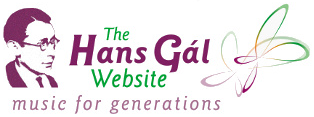The decisive break-through for Gál came with the great success of his second opera, Die heilige Ente ('The Sacred Duck'), a lyrical comic opera in a Chinese setting, which had its première in Düsseldorf in April 1923 under Georg Szell, and was published as his Op. 15 by Universal Edition. It was immediately taken up by another six theatres and was eventually performed with continued success in over twenty theatres, including Breslau, Weimar, Aachen, Chemnitz, Kassel, Königsberg, Prague and Berlin, during the next ten years. It was performed on Vienna Radio in 1929 - the first modern opera to be staged by the station. The main part was sung in several of these performances by the well-known opera singer Josef Witt. The work was still in the repertoire of German opera houses in 1933, when its successful run came to an abrupt end as a result of the political circumstances. Die Heilige Ente was Gál's first collaboration with the librettist Karl Michael von Levetzow, whom he had met during his work at the Neue Wiener Bühne, and for whose play Ruth he had composed the incidental music. Richard Strauss had said: "If I hadn't found Hofmannsthal, I would have liked to work with Levetzow" [quoted from Waldstein, op. cit., p. 40]. More will be said of Levetzow below)
Gál's essay 'On the problem of comic opera' of 1927 doesn't mention his own operas but is especially enlightening about his relationship to his textual material and could be applied in its entirety to his Heilige Ente :
"Comic opera only has a genuine potential for effect (it can by its very nature make no use of the naturalistic device of an exciting and brutally nerve-wracking plot), when it is also capable of arousing a strong emotional reaction. Comic as well as serious opera must be able to do this. For this it needs - the most obvious of all platitudes! - music. Genuine, heartfelt and original, sung and inspired music! And now comes the creative secret of the dramatically sensitive musician: he must have material which grips him in order to produce something which is in turn gripping... One thing seems clear to me: the only thing that can release creative energies in an artist, if he really is one, will - in the field of comic opera - not be a silly farce or a witty parody, be it ever so clever, but a character comedy, dealing with genuine, deeper human themes. The heart of all genuine musical drama lies in what is human..." [ Musikblätter des Anbruch IX, Vol. 1/2, pp. 91-2, 1927]
The plot of the opera does indeed revolve around human characters, bordering at times on the tragic, but with a good dose of humour, too. Involving gods, priests, a mandarin, a simple coolie, opium, changes of identity, and not least a duck, it offered full scope for Gál's creative imagination, ranging from the tender and expressive to the ironically humorous, all infused with an oriental touch. It was extremely effective on the stage. The opera, rooted in the German comic operatic tradition, was greeted by Paul Nettl as "a new high-point in the line of development Lortzing-Nicolai-Cornelius-Götz" [quoted from Waldstein, op. cit., p. 41].







